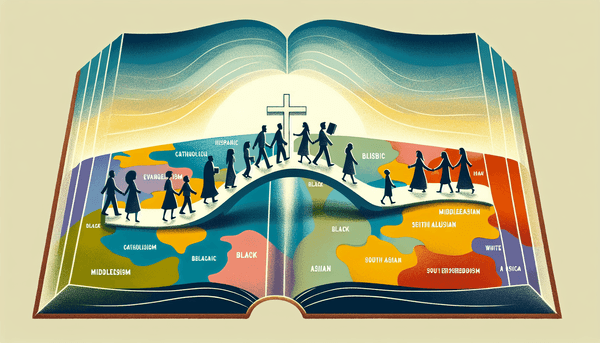Lent: A Journey of Reflection and Repentance
Lent is a season of penitence and spiritual renewal, a 40-day journey mirroring Jesus' own time of fasting in the wilderness, as recounted in Matthew (4:1-2). Though not explicitly mentioned in the Bible, the practice of Lent draws from scriptural principles of fasting, prayer, and repentance. The prophet Joel (2:12-13) calls for a heartfelt return to God with fasting, weeping, and mourning, illustrating the deep introspection and commitment that characterizes Lent. It is a period when believers are encouraged to engage in self-examination, as they heed the call of Isaiah (58:6-7) to a fast that looses the chains of injustice and sets the oppressed free. The Lenten season also echoes the call of 2 Chronicles (7:14) for God's people to seek His face and turn from their wicked ways, culminating in the promise of Acts (3:19) that repentance brings times of refreshing from the Lord.
Understanding Jesus' Teachings in Mark 2:19-22
Jesus' teachings in Mark 2:19-22 provide a rich metaphorical framework for understanding the transformative nature of His message. In these passages, Jesus likens Himself to a bridegroom, whose presence negates the need for His disciples to fast, a stark contrast to the practices of the Pharisees and John the Baptist's disciples. The subsequent imagery of new wine needing new wineskins serves as a powerful allegory for the new covenant He was establishing, one that could not be contained within the old structures of religious tradition. As Jesus' message was one of renewal and change, He urged His followers to adopt a new mindset to fully embrace the implications of His teachings. This call to spiritual flexibility and openness is exemplified in His parables about unshrunk cloth and new wine, which illustrate the incompatibility of His revolutionary teachings with rigid, old forms.
The Sabbath: A Day of Rest and Worship
The concept of the Sabbath holds great significance in both Jewish and Christian traditions, established as a day of rest and worship from the earliest accounts of creation in Genesis (2:2-3). The commandment to 'remember the Sabbath day' in Exodus (20:8-11) underscores its importance as a time for cessation from labor and a reminder of God's rest after creation. In the New Testament, Jesus reframes the Sabbath, emphasizing its purpose for humanity's benefit, as stated in Mark (2:27). The book of Hebrews (4:9-10) speaks of a Sabbath rest for the people of God, a spiritual rest that goes beyond the observance of a particular day. The Sabbath becomes a symbol of the rest found in Christ and an opportunity for believers to reflect on their relationship with God, as Jesus Himself exemplified by regularly attending the synagogue on the Sabbath, according to Luke (4:16).
FAQ
Q: What is the significance of Easter in the Christian faith?
A: Easter is the celebration of the resurrection of Jesus Christ, marking His victory over sin and death and offering the promise of eternal life to believers. It is the most important event in the Christian calendar.
Q: Where in the Bible can I find the accounts of Easter?
A: The biblical account of Easter is found in the Gospels of Matthew, Mark, Luke, and John. These books describe Jesus' crucifixion, burial, and resurrection, which is celebrated on Easter Sunday.
Q: What is the purpose of Lent in the Christian tradition?
A: Lent is a 40-day season of fasting, prayer, and repentance leading up to Easter. It is a time for believers to reflect on their lives, turn back to God, and prepare their hearts for the celebration of Jesus' resurrection.
Q: Who were the Pharisees, and what role did they play in the New Testament?
A: The Pharisees were a religious group in Judaism known for their strict adherence to the law. In the New Testament, they are often depicted as questioning and sometimes opposing Jesus. However, some Pharisees were open to His teachings and became followers.






